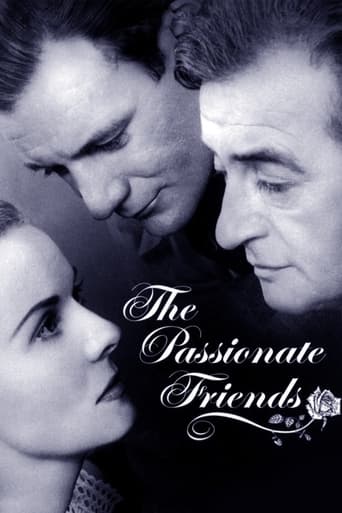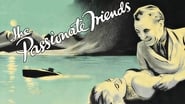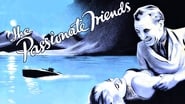BILLYBOY-10
I hear David Lean married his star Ann Todd during the filming of this flick so that would explain the inordinate number of grueling close-ups of the ever suffering Mary in this long drawn-out soapy melodrama.Mary loves Steve and vice-verse but she wont marry him because she wants to be herself or whatever and she is last seen fleeing the scene. The movies begins at a ball in or around 1948 then a flash-back to another ball 1938-39 new years, then a flash-back within a flash-back at scenes of love and love. Confusion ensues, at least for me because I'm not sure if it's suppose to be circa 1948 or flash- back #1 or #2. Anyway, Mary ends up marrying much older but ironically filthy wealthy banker Claude Raines (bad toupee) because she likes his money and their twin beds.Then she meets Steve again and loves him again and they have an affair and she is gonna leave Claude for Steve but doesn't but then he wants a divorce and she doesn't and then he kicks her out of the mansion and she goes down the near-by tube station to plunge herself in front of a train but Claude miraculously appears and saves here and they go off to the mansion and I guess live miserably ever-after (meanwhile Steve has married and has two kids and seems happy or not, I'm not sure). I never heard of this film before (no wonder) and only watched it on FilmStruck because of David Lean. Well, you can't win them all.
secondtake
The Passionate Friends (1949)You wonder how this movie would be told without the Hays Code (and its British counterpart) hovering over the scriptwriter and director. But here we have David Lean's version of the much older H.G. Wells novel (from just before WWI) with all the restraint of movie romances of the period. That is, without our modern idea of passion.And that's one of the things that makes this really work. It's not about making love on the sly, or going rapturous on screen. It's about the complicated emotional needs and conflicts of three people. That's what passion boils down to, at least in a way that we want to spend time with. And though this is not a full fledged love triangle like "Jules and Jim" (it's one woman caught between two men), it does play with the clashing and melding of three personalities and their passions.Oddly, you learn fairly soon that the passion of the older man, played by Claude Rains, is deliberately not passionate. That's not what he wants in love. The younger man (not by much) is played by Trevor Howard and he is a sweetheart, with a family, and yet he still has that pure ideal love for the woman he can't shake. Even though she is married to the older man.The woman holds it all together, both in the story, since she is involved with both men, and in the movie, played with amazing force and nuance by Ann Todd. When she first appeared on screen, thinking to herself on a plane taking off, I thought she was a little like Joan Fontaine, and since I love Fontaine, I was going to be open to this inferior version. But she wasn't inferior one bit. The longer the movie went on, the more I realized what a deeply felt, complex performance Todd gives. She not only has to be a different kind of woman with each of the men, she has to do so in different time periods over about eight years. Great stuff. I want to watch it again just to appreciate her. She was almost wholly a British actress, not moving to Hollywood, and so she never had an American audience the way some of the more famous stars here naturally did. Too bad for everyone.The movie, as such, has a little inevitability to it--not that we know how it will end, exactly, but that we know how it will probably end, the one or two main options. The rivalry, the jealousy, the caught looks across a train station, the views from the Italian Villa, all the clichés are here. They are all perfectly handled, for sure, but an edge of originality would have helped a lot. I'm very curious to read the Wells book just to see how complex he makes the woman, and the story. And to check the ending he had in mind in 1913.Lean, the director, is a legend of course. He made so many really fine films, important ones, it's easy to overlook this one. Even the slightly similar (in feel) "Brief Encounter" from 1945 casts a huge shadow here. Throw in "Lawrence of Arabia," "Dr. Zhivago," "Blithe Spirit," "Bridge over the River…." You get the idea.See this. Expect nothing sensational, and you'll be sucked into a really superb, conventional, beautiful romantic drama. I just read (and gave a thumbs up) to a long review for this film that seems incredibly perceptive, but which maybe forces too much analysis onto the motives of the players here--especially for someone who hasn't seen it yet. I suggest getting sucked in and taking the advice to be patient, but also forging your own view of the events and hearts involved.
writers_reign
Talk about referential: There's a moment very early on in which Ann Todd has just arrived on holiday from England and explores the hotel suite where husband Claude Rains will join her in a day or two. The suite is one of a pair with adjoining rooms and she walks out onto a balcony telling us in voice-over of an old lover, Trevor Howard who - unknown to her, has just arrived in the adjoing suite. Lean shoots this scene full on so that we see both balconies and as Todd emerges on to the one on the right it is the next best thing to a steal from the opening of Private Lives as it's possible to get. Private Lives was, of course, written by Noel Coward, the same Noel Coward who also wrote a one-act play called Still Life which was in turn directed by David Lean as Brief Encounter, which starred Trevor Howard. Thankfully Lean - who also worked with Coward memorably on In Which We Serve, This Happy Breed and Blithe Spirit - stops short of having Howard emerge on to the adjoining balcony and allows the film to veer towards another Coward one-act play become film, The Astonished Heart, both being variants on the eternal triangle, both featuring a leading character attempting suicide (and succeeding in The Astonished Heart). The original novel by H.G. Welles appeared on the eve of the first world war and apart from the title little else is retained in a version which begins and ends in real time (1948) and moves back to 1939 and 1935 for glimpses of the long-standing affair between Todd and Howard. Not unexpectedly Rains, who is not often associated with leading-man status, steals the film from a Howard who does little save exhibit an off-key charm and a Todd who makes an art-form out of anguish. If it's arguably the weakest of Lean's forties output we are measuring it against Great Expectations, Oliver Twist, Blithe Spirit, This Happy Breed and his masterpiece Brief Encounter which should put it into perspective.
Steffi_P
For The Passionate Friends David Lean treads similar ground as he does in his masterpiece, Brief Encounter, although here the source material is an HG Wells story as opposed to a Noel Coward play.The post-war Lean, with his attention to psychology and emotions, handled these stories of problematic romance brilliantly, and The Passionate Friends is a great example. We open with clouds and snow-capped mountains, a holiday location that foreshadows Lean's Summertime (1955), straight away giving us a sense of dreaminess and soaring emotions.This is Lean at his most psychological and expressionist. The sound and imagery is always calculated to mirror feelings – like the abruptness of the plane wheel touching the ground when Claude Rains returns from his trip abroad. The acting really supports this too. Considering it's a story about a love triangle, a large amount of the story is told through scenes in which one of the three principal characters is alone, or at least unobserved, and the actors convey inner thoughts through subtle expressions and gestures.Also, like the bulk of Lean's pictures from this era there are references to the war and the impact it had on British society. It's probably no coincidence that the decision was made to set the flashbacks of the affair in 1939 (Wells' original story was decades older), the year that war broke out. The cold, bureaucratic Claude Rains seems to be in part symbolic of the necessity in wartime to be rational and emotionless, and the story is an allegory for the need to break away from that.While it is a good story and very well-made, The Passionate Friends is unfortunately no Brief Encounter. On the acting side, Claude Rains is brilliant as always, but I'm less convinced by Ann Todd, who perhaps got the part more because she was Mrs Lean that for her talent. The plot can be a bit confusing with its flashbacks within flashbacks. Probably the biggest problem though is that we never get to totally empathise with the characters. While Brief Encounter's sheer ordinariness made it so universal, you don't get this to the same degree here, and that makes it by far the weaker of the two pictures. Still, it's by no means a disaster, and still one of the better films of David Lean's 1940s output.





